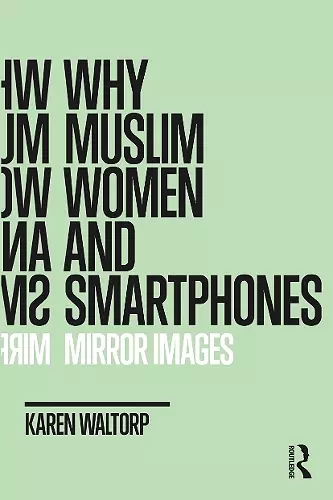Why Muslim Women and Smartphones
Mirror Images
Format:Hardback
Publisher:Taylor & Francis Ltd
Published:20th Feb '20
Currently unavailable, and unfortunately no date known when it will be back
This hardback is available in another edition too:
- Paperback£42.99(9781032174334)

An ethnographic account of how Muslim women in Denmark use social media to navigate their worlds, presenting a series of important issues around anthropological approaches to new media.
Using an assemblage approach to study how Muslim women in Norrebro, Denmark use their phones, Karen Waltorp examines how social media complicates the divide between public and private in relation to a group of people who find this distinction of utmost significance.Using an assemblage approach to study how Muslim women in Norrebro, Denmark use their phones, Karen Waltorp examines how social media complicates the divide between public and private in relation to a group of people who find this distinction of utmost significance. Building on years of ethnographic fieldwork, Waltorp's ethnography reflects the trust and creativity of her relationships with these women which in turn open up nuanced discussions about both the subject at hand and best practice in conducting anthropological research. Combining rich ethnography with theoretical contextualization, Waltorp's book alternates between ethnography and analysis to illuminate a thoroughly modern community, and reveals the capacity of image-making technology to function as an infrastructure for seeing, thinking and engaging in fieldwork as an anthropologists. Waltorp identifies a series of important issues around anthropological approaches to new media, contributing to new debates around the anthropology of automation, data and self-tracking.
"Karen Waltorp's intimate and sensitive exploration of the world as navigated by young Danish Muslim women through their smart phones is both theoretically innovative and ethnographically rich. Operating as window, mirror, screen, and relational device for anthropologist and research participants alike, the smart phone emerges as a rich and complex medium through which diasporic and ethnographic imaginaries are made real. This is digital anthropology at its best." - Emma Tarlo, Goldsmiths, University of London, UK
"Original, well written, persuasive. Karen Waltorp fluently moves between scales—the person, the apartment, the neighborhood, the nation, and international ties—and among disciplines, to analyze the spaces, relationships, and actions that young Muslim women in Denmark establish through their phones." - Laura Marks, Simon Fraser University, Canada
"This is a stunning and powerful book that, through a series of innovative research methods, creates a beautiful and nuanced ethnography full of intimacy and insight - a future classic in the anthropology of media." - Christopher Wright, Goldsmiths, University of London, UK
"Why Muslim Women and Smartphones: Mirror Images offers an ethnographically rich, methodology innovative and brilliant contribution to the study of contemporary social life. It shows how the smartphone has become a key witness to much of what life offers—from births to deaths; from the ordinary to extraordinary, from birth to death—and much else besides. In doing it builds an intimate portrait of women’s relations, hopes, fears and futures and is likely to become an important reference point that has relevance across disciplines." - Andrew Irving, Professor of Anthropology, University of Manchester, UK
"Waltorp develops powerful conceptual tools for us to rethink anthropology as a project that can be tilted towards seeing together and differently rather than rendering worlds transparent….what does it teach us about another, possible anthropology (Pandian, 2019)? What are the opportunities and limits of a harakat ethnography as it takes up the subversive, playful, and reflexive digital play of the young Muslim women from Blaagaarden as a mode of knowing together? Overall, the book offers a compelling way forward in theorizing digital-visual methods and will be a vital addition to teach upper-level undergraduate and graduate students contemporary approaches to (multimodal) anthropology. …Waltorp utilizes a novel writerly strategy. She sets up the book to alternate between ethnographically grounded chapters that weave together – through the description and analysis of images and scenes – a composite picture of the worlds of her informants, and ‘mirror’ image chapters that attempt a ‘figure-ground reversal’ where the knowledge-making project undertaken in each ethnographically grounded chapter becomes an object of scrutiny. Through this juxtaposition, Waltorp explores the meaning-making practices and embodied encounters that place the smartphone at the centre of what she calls a real virtuality, a correspondence between the phenomenological and iterative representations of it. Throughout, she provides a deeply reflexive account of her position and relationship with the young women as an anthropologist seeking to understand cultural worlds nearby, in the country that she calls home as an ethnic Dane. Waltorp’s keen sensibility around the limits of ethnography – whether wired through the digital or otherwise – demonstrates a deep understanding of what Edouard Glissant (1991) calls the right to opacity, a recognition of ‘that which cannot be reduced’ (52)." - Ethiraj Gabriel Dattatreyan in Ethnos
ISBN: 9781350127357
Dimensions: unknown
Weight: 530g
200 pages